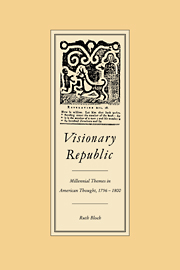Book contents
- Frontmatter
- Contents
- Acknowledgments
- Introduction
- PART I THE DEVELOPMENT OF A MILLENNIAL TRADITION IN COLONIAL AMERICA
- 1 Millennialism and the origins of Anglo-American radicalism
- 2 Colonial millennialism on the eve of the revolutionary crisis
- PART II THE RISE AND DECLINE OF MILLENNIALISM IN THE REVOLUTIONARY ERA
- PART III THE ESCHATOLOGICAL REVIVAL OF THE 1790'S
- Notes
- Index
1 - Millennialism and the origins of Anglo-American radicalism
Published online by Cambridge University Press: 29 October 2009
- Frontmatter
- Contents
- Acknowledgments
- Introduction
- PART I THE DEVELOPMENT OF A MILLENNIAL TRADITION IN COLONIAL AMERICA
- 1 Millennialism and the origins of Anglo-American radicalism
- 2 Colonial millennialism on the eve of the revolutionary crisis
- PART II THE RISE AND DECLINE OF MILLENNIALISM IN THE REVOLUTIONARY ERA
- PART III THE ESCHATOLOGICAL REVIVAL OF THE 1790'S
- Notes
- Index
Summary
… and they lived and reigned with Christ a thousand years.
Revelation 20:4Historians of American revolutionary thought now generally trace the origins of eighteenth-century Anglo-American radicalism to the civic republican tradition imported from the English radical whigs. Although much attention has been given to the transmission of eighteenth-century English republican literature to the colonies in the decades before the American Revolution, there has been a tendency to overlook the religious context in which civic republican ideas first arose in England and which continued to supply much of their meaning in America. It can scarcely be overemphasized that radical whig ideology grew out of the experience of the English Revolution and Commonwealth of the 1640's and 1650's. Remembered with mixed feelings in both England and America, this event was nonetheless the source of many of the cherished political principles supposedly confirmed by the more openly celebrated and moderate Glorious Revolution of 1688–9. Far more than the 1680's, the 1640's and 1650's in England were also years of millennial expectation. Millennialism and civic republicanism gained ascendency together in revolutionary England, and together they also gave rise to American revolutionary ideology during the next century.
THE PURITAN REVOLUTION AND EIGHTEENTH-CENTURY ENGLISH RADICALISM
Although eighteenth-century English political dissent included a few Jacobites who mourned the end of the Stuart reign, the whig opposition always drew more conspicuously on seventeenth-century Puritan revolutionary thought.
- Type
- Chapter
- Information
- Visionary RepublicMillennial Themes in American Thought, 1756–1800, pp. 3 - 21Publisher: Cambridge University PressPrint publication year: 1985
- 1
- Cited by



